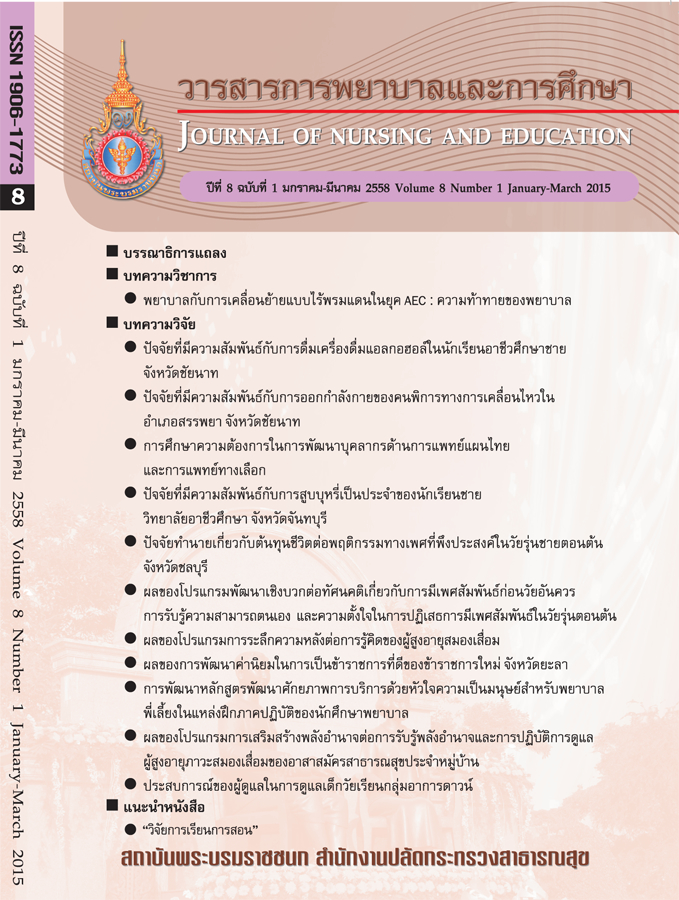ผลของโปรแกรมการเสริมสร้างพลังอำนาจต่อการรับรู้พลังอำนาจ และการปฏิบัติการดูแลผู้สูงอายุภาวะสมองเสื่อม ของอาสาสมัครสาธารณสุขประจำหมู่บ้าน
คำสำคัญ:
Empowerment, Perceived Empowerment, Caregiving Practice, Health Volunteersบทคัดย่อ
บทคัดย่อการวิจัยกึ่งทดลองมีวัตถุประสงค์เพื่อศึกษาประสิทธิผลของโปรแกรมการเสริมสร้างพลังอำนาจ
ต่อการรับรู้พลังอำนาจและการปฏิบัติการดูแลผู้สูงอายุภาวะสมองเสื่อมของอาสาสมัครสาธารณสุขประจำหมู่บ้านโดยเลือกกลุ่มตัวอย่างแบบเฉพาะเจาะจงเป็นอาสาสมัครสาธารณสุขประจำหมู่บ้านของโรงพยาบาลส่งเสริมสุขภาพสมเด็จย่า 84 ตำบลบึงน้ำรักษ์ อำเภอธัญบุรี จังหวัดปทุมธานีที่มีผู้สูงอายุภาวะสมองเสื่อมในความรับผิดชอบดูแล ความรุนแรงระดับน้อย-ปานกลางระหว่างเดือนสิงหาคมถึงเดือนตุลาคม พ.ศ. 2557 กลุ่มละ 30 คน กลุ่มทดลองเข้าโปรแกรม 5 ครั้ง ใช้เวลา 10 สัปดาห์กลุ่มควบคุมได้รับการให้ความรู้
ตามปกติ เครื่องมือในการวิจัยครั้งนี้ประกอบด้วยโปรแกรมการเสริมสร้างพลังอำนาจโดยประยุกต์แนวคิดการเสริมสร้างพลังอำนาจแบบสัมภาษณ์การรับรู้พลังอำนาจ และการปฏิบัติการดูแลผู้สูงอายุภาวะสมองเสื่อมซึ่งผ่านการตรวจสอบความตรงเชิงเนื้อหาและความเที่ยงได้ค่าสัมประสิทธิ์อัลฟ่าของครอนบาค
(Chronbach’s Coeffcient Alpha) เท่ากับ 0.86 และ 0.89 สถิติที่ใช้ในการวิเคราะห์ข้อมูลได้แก่
การแจกแจงความถี่ ร้อยละ ค่าเฉลี่ย และส่วนเบี่ยงเบนมาตรฐานค่าสถิติ t-test independent และ pair t-test
ผลวิจัยพบว่าภายหลังการทดลอง กลุ่มที่ใช้โปรแกรมการเสริมสร้างพลังอำนาจ มีคะแนนเฉลี่ย
การรับรู้พลังอำนาจสูงกว่าก่อนการใช้โปรแกรมการสร้างพลังอำนาจอย่างมีนัยสำคัญทางสถิติและสูงกว่ากลุ่มควบคุมอย่างมีนัยสำคัญทางสถิติ(p-value < 0.000) และภายหลังการใช้โปรแกรมการสร้างพลังอำนาจ กลุ่มที่ใช้โปรแกรมการสร้างพลังอำนาจต่อการรับรู้ความสามารถแห่งตนมีคะแนนเฉลี่ยการปฏิบัติการดูแล
ผู้สูงอายุภาวะสมองเสื่อมสูงกว่าก่อนการใช้โปรแกรมการเสริมสร้างพลังอำนาจ และสูงกว่ากลุ่มควบคุมอย่างมีนัยสำคัญทางสถิติ(p-value < 0.000) เช่นกัน
สรุปและข้อเสนอแนะ ผลการวิจัยเป็นแนวทางให้บุคลากรในทีมสุขภาพนำโปรแกรมไปใช้
กับอาสาสมัครสาธารณสุขประจำหมู่บ้านเพื่อดูแลผู้สูงอายุภาวะสมองเสื่อมในชุมชน และควรมีการพัฒนาโปรแกรมเสริมสร้างพลังอำนาจในกลุ่มผู้ดูแล (Care giver) เช่น บุตร หรือญาติของผู้สูงอายุที่มีภาวะสมองเสื่อม
คำสำคัญ : การเสริมสร้างพลังอำนาจ การรับรู้พลังอำนาจ การปฏิบัติการดูแล อาสาสมัครสาธารณสุข
ประจำหมู่บ้าน
Abstract
The purpose of this quasi-experimental research was to study the effectiveness of an
empowerment program on perceived empowerment and practice of health volunteers to dementia of elderly. Research samples were purposive selected from health volunteer of primary care (Somdejya 84) in Bueng Nam Rak, Thanyaburi District, PrathumthaniProvince,have been responsibility had lower and middle class. The duration is August to October 2014. Each 30 elderly people had assigned into one experimental group and one control group. The on experimental group received the empowerment program five times in ten weeks, while the control group received routine education. The research instrument were the empowerment program was able to apply empowerment theory, the perceived empowerment questionnaire and a questionnaire caregiving practice of health volunteers to
dementia elderly . Data were analyzed using frequency, percentage, mean, standard deviation, t-test independent and pair t-test.
The results showed that the subjects in the experimental group significantly improved their empowerment after participating in the empowerment program level and significantly higher than that of the control group (p < 0.000) After the experiment, the mean score of empowerment program on perceived empowerment, also significantly higher than that of control group (p < 0.000)
Conclusions and suggestion. The finding suggest that the health team bring to
the empowerment program for health volunteers to dementia eldery in community and should be to
the develop empowerment program of caregiver as child or relative to dementia eldery.
Keywords : Empowerment; Perceived Empowerment; Caregiving Practice; Health Volunteers






